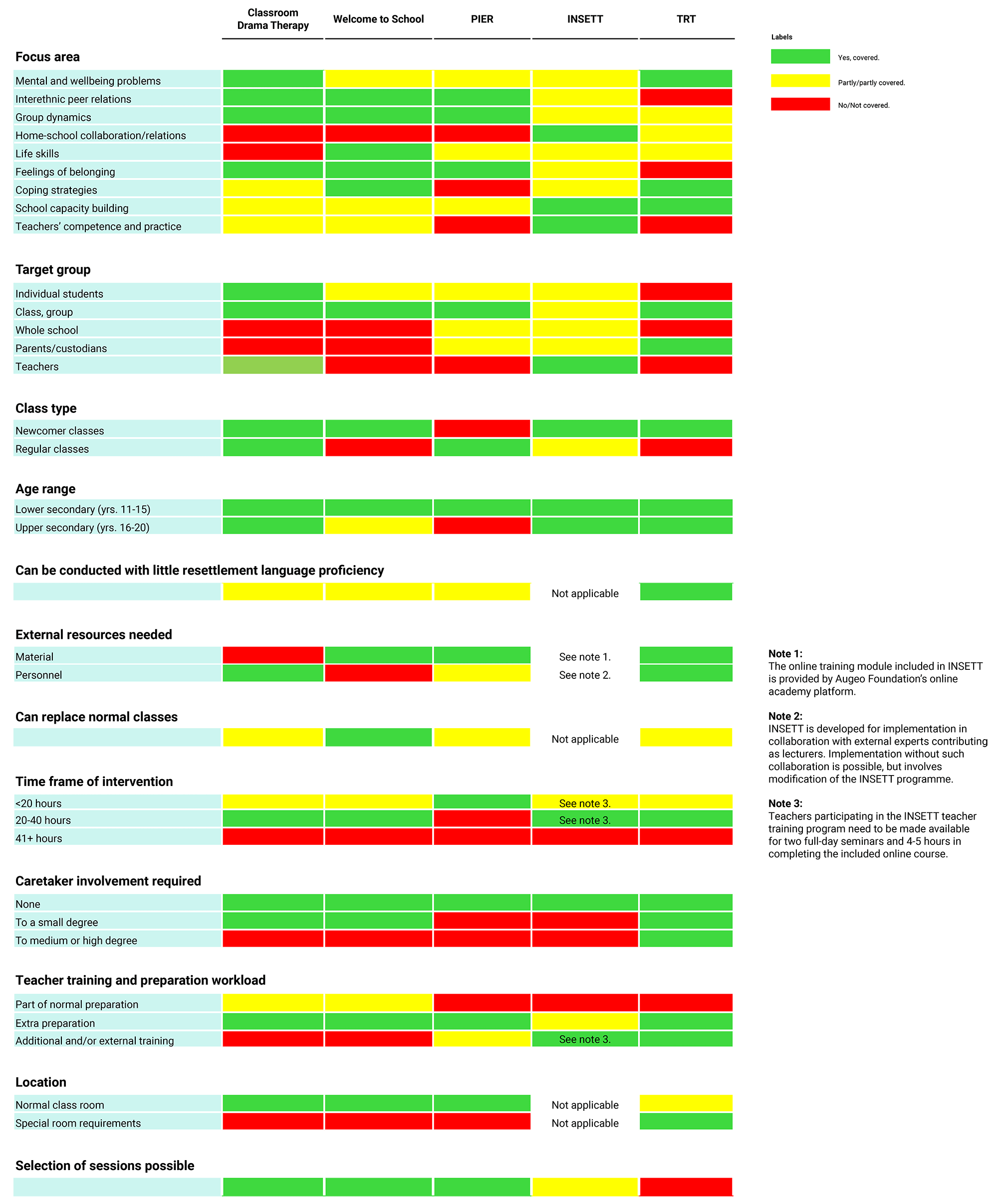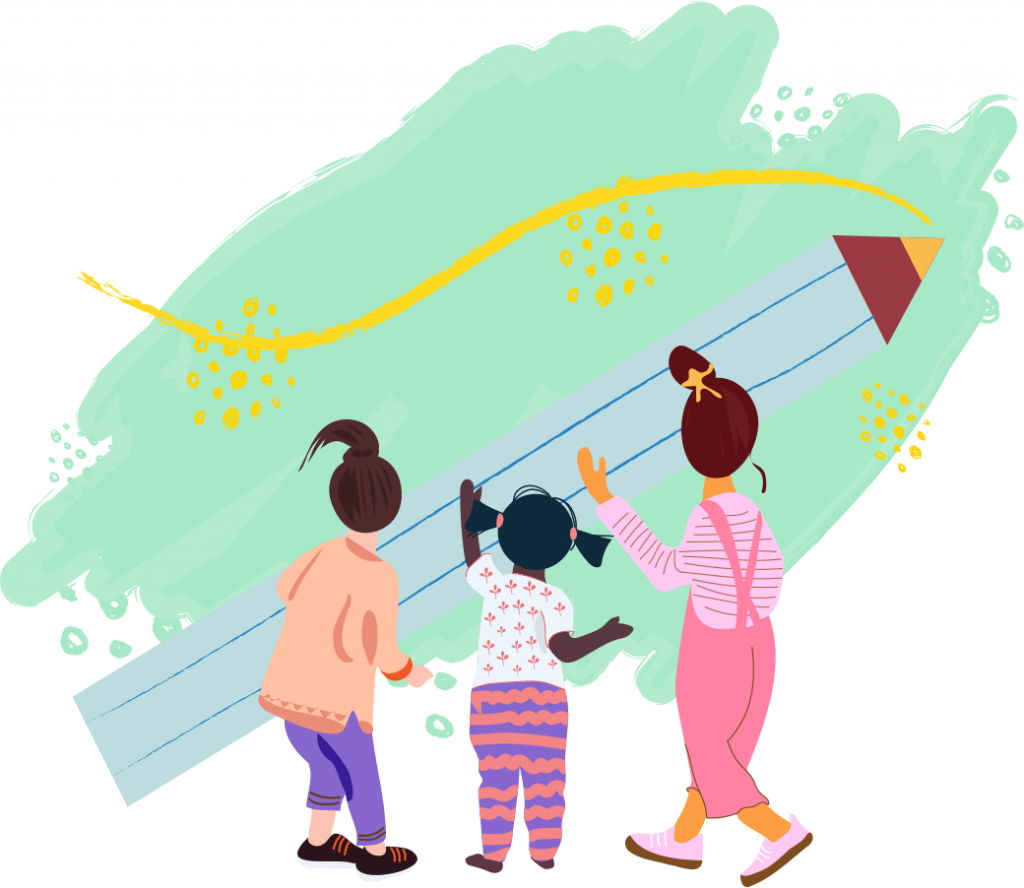Choosing the right psychosocial intervention to implement in schools is not easy. This is why we designed this tool. Here we assist you in deciding which RWS intervention might be the most suitable for your secondary and upper secondary school and to your school context. Fill in the quiz, and/or take a look at the intervention overviews!
What psychosocial intervention is the most suitable for my school(s)?
Interventions features
This table provides an overview of the features of the five interventions, including the costs involved.

WTS
Implementing Welcome to School (WTS) involves costs for teacher preparation of the 14 sessions (e.g. similar to normal teacher preparation). The teacher manual and students’ workbook can be downloaded for free at https://www.pharos.nl/english/youth-health-programme/school-programmes-for-refugee-youth-in-secondary-education/ but costs related to printing the manual and workbooks must be foreseen.
Translated and adapted versions of WTS exist for the following countries/languages: Danish, Dutch (for the Netherlands), Dutch (for Belgium), English, and Norwegian. If implemented in other languages or
country contexts, translation and adaptation costs related to the WTS manual and workbook must be added.
Classroom Drama Therapy
Implementing Classroom Drama (CD) requires recruiting a creative therapeutic team to deliver the intervention within the school context. Members of this team are provided with a salary that allows them to familiarize themselves with the intervention and compensates them for their hours preparing and delivering the intervention. During the intervention, the creative therapeutic team works in close collaboration with the class teacher, who is expected to be present at each session. Additional costs may relate to materials used during the Classroom Drama sessions (e.g. musical instruments, fabrics, props to support creative expression).
Teaching Recovery Techniques (TRT)
Implementing the Teaching Recovery Techniques (TRT) intervention involves costs for 3-4 days of training in delivery of the intervention plus fees for reimbursements and venues. Access to the TRT manual developed by the Children and War foundation is included in the training costs. The manual is available in multiple languages. In addition, costs for preparation and intervention delivery (8h) for the teachers/facilitators are needed as well as costs for reimbursements to participating students.
PIER
The PIER manual and accompanying student materials are freely available online. The student materials require printing. All other material costs are incidental and only apply to stationery (scissors, larger sheets of papers, and felt-tip pens). These could likely be provided by the schools in most instances.Classrooms need to have access to a white screen to share materials such as PowerPoints and videos.
INSETT
In-Service Teacher Training (INSETT) consists of a combination of physical seminars and online training. Implementing INSETT involves costs for organising two full-day seminars for all participating teachers and for teachers’ participating in the seminars in question (i.e. costs are likely to include temporary replacement teachers). The online training as part of INSETT can be completed in 4-5 hours. The possibility of incorporating participation in INSETT in teachers’ allotted preparation and/or further education time is subject to local conditions and agreement. Translated and adapted versions of INSETT (seminar materials and online training module) exist for the following countries/languages: Finland/Finnish, Norway/Norwegian, Sweden/Swedish. The online training module included in the INSETT programme is and, if needed, the INSETT manual (available in English only) and lectures.
Interventions descriptions
Welcome to School (WTS)
The Welcome to School (WTS) intervention and materials were developed and revised in the Netherlands by Bram Tuk of the Centre of Expertise on Health Disparities (Pharos) and Milleke de Neef of Rutgers, the Dutch national expertise centre for sexual and reproductive health and rights. In RWS, the original intervention was shortened and adjusted to fit the timeline of the study. In the RWS version, WTS consists of 14 sessions that cover issues related to being a young newcomer and include exercises focusing on cultural exchanges, storytelling and roleplay.
The sessions are implemented by the teachers in the newcomer classes. The purpose of WTS is to prevent psychosocial and emotional problems, using the school as a platform for improving the wellbeing of the newcomer by facilitating an improved adolescent-teacher relationship as well as an improved social environment between the adolescents.
Specifically, the intervention seeks to help newcomers feel recognized by their school, teachers and peers, making it easier for them to negotiate social support, and to create positive and meaningful connections between past and present experiences and the future.
For more information on the WTS intervention and how to access it, see:
https://www.pharos.nl/english/youth-health-programme/school-programmes-for-refugee-youth-in-secondary-education/
https://refugeeswellschool.org/intervention/example-intervention/
Classroom Drama Therapy (CDT)
The Classroom Drama Therapy (CDT) program is a nine to twelve-week drama workshop (minimum two school hours or 75 minutes/week) in which refugee and migrant adolescents in multi-ethnic schools work around the construction of group stories. These group activities support the construction of identity and meaning, aiming to establish bridges between past and present and to engage with themes of migration, exclusion, identity and cultural adaptation in host societies. The intervention is based on Boal’s forum and Fox’ playback theatre and was developed and previously studied at McGill Transcultural Psychiatry. It targets refugee and migrant adolescents’ well-being, as well as the quality of classroom relations, and is carried out by an external creative team entering the school context. The creative team works together closely with the classroom teacher(s), who are meant to be present at all time during the intervention.
For more information on the CDT intervention and how to access it, see:
https://refugeeswellschool.org/intervention/classroom-drama-intervention/
Peer Integration and Enhancement Resource (PIER)
The 8-week Peer Integration and Enhancement Resource (PIER) intervention aims to enhance peer interactions between ‘host’ society and migrant and refugee adolescents in schools. The direct target group for the intervention is adolescent students in mainstream classes from diverse backgrounds, including refugee and migrant students and students from the host society. This intervention specifically focuses on schools where the ‘host’ or native population is the majority and where refugees and migrants are smaller in number. The PIER intervention aims to encourage understanding of the experiences of asylum seekers and refugees. It also develops a participatory approach to supporting safe, positive peer interactions and social relationships in multi-ethnic schools. Through clustering pupils from diverse backgrounds in small collaborative groups working together on establishing social connection in the school context, the intervention aims at strengthening school belonging and promoting dialogue between minority and majority groups.
For more information on the PIER intervention and how to access the programme and manuals, see:
https://refugeeswellschool.org/intervention/pier-intervention/
In-Service Teacher Training (INSETT)
In-Service Teacher Training (INSETT) is directed towards teachers and counsellors working with refugee and migrant students. Its objective is to enhance teachers’ knowledge on how refugee and migration experiences may affect young people’s psychosocial wellbeing and school functioning upon resettlement in a new country, and how schools and teachers may better accommodate their particular challenges. The INSETT training programme runs over a period of 10-12 weeks. It consists of three interrelated course modules, i.e., two collective learning modules (whole-day seminars) and, in between, an online training module completed individually by participating teachers comprising of eight thematic sections with video cases, interactive tasks, and information material (“Providing support to refugee youth”, developed and hosted by the Augeo Foundation). INSETT aims to strengthen teachers’ competence and self-efficacy in three areas: (1) Promoting refugee/migrant students’ mental health and psychosocial wellbeing. (2) Encouraging positive interethnic relationships and strengthening school belonging; (3) Fostering supportive interrelationships with parents, caregivers and/or guardians to promote school involvement.
For more information on the INSETT intervention and how to access the programme and manuals, see:
https://refugeeswellschool.org/intervention/intervention-test/
Teaching Recovery Techniques (TRT)
Teaching Recovery Techniques (TRT) is a manualized intervention by the Children and War Foundation (CAW©-copyright Smith, Dyregrov, & Yule, 2018; Yule, Dyregrov, Raundalen, & Smith, 2013, https://www.childrenandwar.org). The TRT is based on cognitive behavioral therapy elements, and it aims to reduce symptoms of posttraumatic stress disorder (PTSD), increase resilience, enhance sense of safety, and train effective coping strategies. Participants are provided practical techniques to deal with traumatic memories, physical and behavioral arousals, and fears. Treatment elements include psychoeducation in playful ways, normalizing reactions to traumatic memories, working with nightmares, scaling anxiety and avoidance, and framing intrusive thoughts and emotions. In school context, students who score above clinically significant cut-off of PTSD are invited to participate the TRT. The CAW -pages provide an assessment tool for school health professionals. The TRT group form consist of seven sessions for adolescents and two for their caregivers. The adolescents’ sessions last 90-120 minutes including training techniques, rehearsal and homework. The TRT handbook provides to each session a number of tools, techniques and procedures to be worked in the group to achieve the treatment aims. The facilitator of the TRT is school health or external professional (psychologist, counsellor, nurse, special teacher) with experiences of group work. To act as TRT facilitator inquires (1) two-day training with licensed trainer of TRT by the CAW; (2) guidance to the recruitment practices of participants, as well as ethical principles and informed consent process, and (3) introduction and exercises to use implementation log-book after every TRT session. and (4) Participation in supervising.
For more information on the TRT intervention and how to access it, see:
https://refugeeswellschool.org/intervention/teaching-recovery-techniques-in-service-teacher-training/
